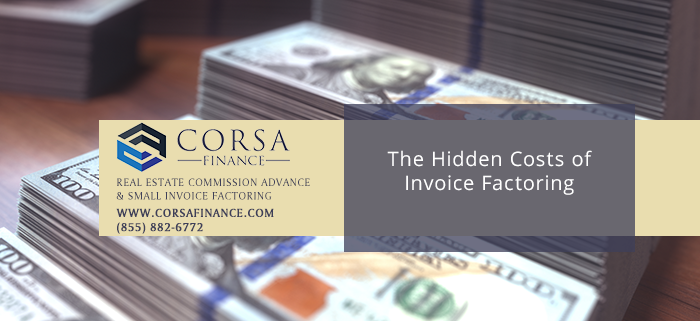Compare key components found in factoring proposals including factoring advances and fees, client obligations and invoice factoring company benefits.
Key Components of Invoice Factoring Proposals
The key components that you will find in proposals for invoice factoring services generally come down to three things: The amount of factoring advances and fees, client obligations and factoring company benefits.
Here are some things to compare when choosing between invoice factoring services:
- Advance Rates
- Reserve Rates
- Factoring Fees
- Add-on Fees
- Funding Options
- Account Limits and Debtor Limits
- Monthly Minimums or Factoring Requirements
- Contract Length and Termination Clauses
- Buy Back Stipulations
- Factoring Client Obligations
- Factoring Program Benefits – Factoring Company Promises
Invoice Advances, Reserves and Factoring Fees
Advance Rate
This is the amount (usually expressed as a percentage) of the face value of an invoice that the factoring company will fund when you factor an invoice.
Reserve Rate
The reserve is an amount (usually expressed as a percentage) of the face value of an invoice that the factoring company will hold back “in reserve” pending payment from your customer on a factored invoice.
Factoring Fee
This is the cost of factoring an invoice. Like the advance and reserve, it is often expressed as a percentage of the face value of an invoice the factoring company will retain as it’s fee when you factor an invoice.
Added together, the advance rate, reserve rate and factoring fee should equal 100%. Here is an example of their application:
- Day 1 – Factor an invoice and get fast funding of 90% of the invoice amount, with 5% held in reserve and a 5% factoring fee.
- Day 30+ – Receive the 5% reserve after your customer has paid the invoice (factoring company retains the other 5% as their factoring fee).
Introductory Advance Rates and Factoring Fees
Some factoring companies use low introductory rates or progressive fee structures that sound appealing, but in actuality represent a higher invoice factoring fee than many of their competitors.
Some factoring fees are flat – meaning a small percentage is the only cost of factoring an invoice regardless of how quick your customer pays the invoice. Other factoring fees might sound low but when reading the fine print you may discover fees are assessed weekly instead of monthly, or are progressive in some other way.
Because of this, a flat, one-time 5% factoring fee might ultimately be less costly to your business than a lower fee offered by a factoring company that assesses the fee weekly, especially if your customer takes several weeks or even longer to pay. Just like compounding interest, the longer the invoice remains outstanding, the higher your cost of financing will be. Given that payment terms are often 30, 60 or even 90 days, a competitive, one-time flat fee will often be far more economical than a low fee applied progressively.
To avoid increasing the cost of factoring, look for proposals where a one-time factoring fee is your “all in” cost of factoring. I.e., there are no additional costs for processing schedules, funding advances, maintaining your account, and so on.
Add-On and Hidden Fees
Some factoring companies have add-on and hidden fees that should be taken into consideration when comparing invoice factoring services; such as fees that will be charged for:
- Schedule processing
- Collection activities
- Due diligence
- Customer credit checks
- Online account access
- Account administration or maintenance
- Funding fees (which may vary depending on method of funding)
- Buy-backs / chargebacks
When reviewing a proposal for invoice factoring services, look beyond the advances and factoring rates to determine if there are add on or hidden costs that might drive up the real cost of invoice factoring, thereby reducing its benefits as a cash flow management tool.
In addition, your proposal for invoice factoring services should also outline the account limit (how much money the factoring company will have out on advances at any given time for all factored invoices) and account debtor limits (the amount the factoring company is willing to have out on advances at any given time for an individual debtor).
Factoring Client Obligations
As the factoring client, your obligations are any and all conditions you agree to fulfill in your relationship with the invoice factoring company (or the Factor). These terms may include personal guarantys, buy back stipulations (especially when factoring with full recourse), monthly minimums, contract termination and notification requirements, and monthly reports your company agrees to provide to the factoring company.
The terms which define your obligations as a factoring client could vary greatly, depending on which invoice factoring company’s services you are considering. Some of these obligations can radically impact how effective the factoring company’s program will be in helping to expedite cash flow for your organization.
Invoice Buy-Back Stipulations
Buy-back stipulations are conditions that require you to buy back an invoice previously factored. Full recourse factoring companies may require you to buy back invoices if they go unpaid for a set period of time, such as 30, 60 or 90 days, etc. They may also require you to buy back invoices if they are not paid due to credit reasons, such as insolvency of your customer. Buy-back stipulations may also require you to reimburse a factoring company for collections or legal activities undertaken in trying to recover unpaid customer payments.
Opting to factor with a non-recourse factoring company may afford your business additional financial protection. If an invoice that has been factored is not paid due to insolvency of your customer, in most cases the non-recourse factoring company will absorb the loss, not you. With non-recourse factoring, clients aren’t usually required to buy back invoices unless an invoice is disputed by the customer.
Factoring Minimums
Some factoring proposals require that you factor a minimum dollar amount or a minimum number of invoices each month, or may stipulate a higher factoring fee be charged if minimums are not met. Some proposals require that a client factors any and all invoices generated for a given client, or even that they factor all of their receivables.
Working with a factoring company that doesn’t require you to commit to factoring minimums can keep you in the driver’s seat, so that you can do what is in the best interest of your organization and factor only when you choose. We offer spot factoring and no-minimum factoring proposals so you can stay in control.
Contract Termination and Notification Clauses
If you decide to stop factoring or you have determined that the invoice factoring services offered by another company would be better for your business, some factoring contracts will require that you provide advance notification – sometimes as much as 120 days in advance.
Failure to meet the notification requirements might make it impossible for you to make a change without absorbing significant financial penalties, or you may have to wait another 8-9 months before you can stop factoring or change factoring companies.
Before signing a factoring agreement, find out what penalties or notification requirements will apply should you decide to stop factoring or take your business to a different factoring company. You may also look for a factoring company (like Corsa Finance) that doesn’t require you to sign a long-term contract or penalize you if you decide to stop factoring with us.
UCC-1 Filing
As a client, you should never sign a proposal that gives a factoring company authorization to file a UCC-1 financing statement on your business before you have been allowed to review all of the closing documents (e.g., factoring contracts) that will apply to the relationship.
Benefits to Look For in an Invoice Factoring Agreement
The benefits outlined in proposals for invoice factoring services that will be provided by the factoring company are the promises and perks that their clients will enjoy, in addition to expedited cash flow from factoring invoices. This includes factoring advance rates but may encompass promises of good customer service, knowledgeable account managers, client online account access, reports, funding options, credit checks on customers, etc.
Since the program benefits provided by factoring companies may vary greatly, here are some of the benefits you might want to look for in a factoring agreement.
- Fast funding on advances (ACH) – within 1-2 business days (or even faster)
- Additional funding choices (wire funding, etc.)
- Free credit checks to help you vet new customers or establish limits
- Consistently high level of professional customer service
- Dedicated account managers who understand the client’s business and preferences
- 24 x 7 online account access
- Transparency – no hidden fees
- No application or account administration fees
- No long-term contracts or monthly minimums
- Spot factoring and micro-factoring
- Competitive advances and factoring fees
- Non-recourse factoring to reduce credit risk
- Non-notification factoring to white label a seamless experience for your clients
Benefits of Working with the Best Invoice Factoring Companies
The primary reason companies factor invoices is to expedite cash flow, whether to meet expenses or grow an organization more quickly, and often both. When comparing invoice factoring services, take into account the extent to which the program seems designed to help you speed up cash flow so that you can reinvest in your organization more quickly.
- The best factoring companies look for reasons to say “yes” when it comes to approving a client or approving an account debtor, even when it means looking past a credit score or list of assets.
- The best factoring companies offer competitive rates and fees and have a program that is transparent, so that their clients are not hit with unexpected fees or surprises.
- The best factoring companies leave more decisions up to the client so that they can do what is in the best interests of their organization.
- The best factoring companies become trusted financial partners because they design their programs, operate and provide professional customer service – day in and day out – with a view for the long-term.
Get a free, no-obligation proposal for invoice factoring services or request more information about our programs by applying online, calling us at 866-855-6772 or completing the form below. We’ll listen to what’s most important to you and your business and work with you to design a factoring program that represents a good match, so you can stay focused on your business.












